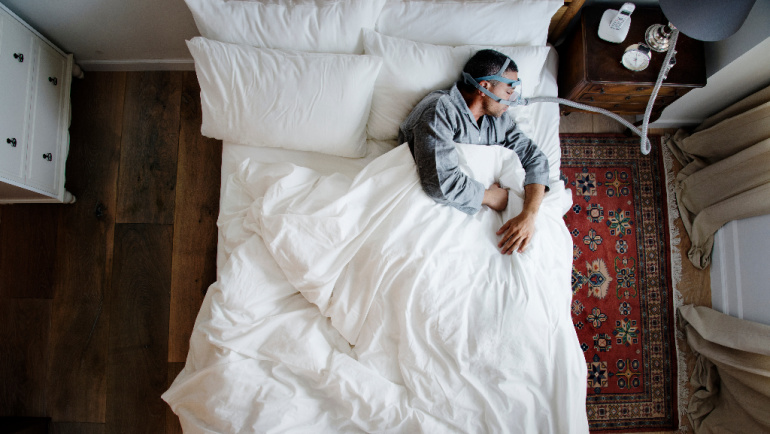
In the fall of 2019, a team of nationally renowned investigators led by Safwan Badr, M.D., M.B.A., chair and the Liborio Tranchida, M.D., Endowed Professor of Internal Medicine at Wayne State University, and Jennifer Martin, Ph.D., professor of medicine at the David Geffen School of Medicine at the University of California, Los Angeles, received a five-year, $3,479,967 grant from the National Institutes of Health to investigate improved management of patients with sleep disordered breathing (SDB). The two are co-principal investigators of the study “Improving outcomes for patients with SDB and insufficient sleep.”
Just a few months into the research, the study was paused because of the lockdown. “We were ready to start enrollment and had a number of individuals ready to begin the study; then in February, the pandemic hit and we had to pause until we could resume safely. We transitioned most of our study to using telehealth, which has become more common in healthcare overall,” Badr said.
Sleep disordered breathing is a common disorder that afflicts an estimated 25 million adults in the United States alone. In addition, one third of American adults suffer from insufficient sleep, defined as less than seven hours per night. “Insufficient sleep is a national epidemic,” Badr said. Failure to consider the role of insufficient sleep is a major limitation in many studies on the potential benefits of treating SDB with positive airway pressure therapy. The results of our new study will have significant clinical implications in the management of patients with a combination of SDB and insufficient sleep.”
The COVID-19 pandemic has caused major disruptions and challenges for clinical research as the population adjusts to a new normal that has changed daily routines. Today’s norm — working remotely, social distancing, mask wearing, shuttered entertainment venues — has redefined daily activities while pausing many research projects.
During the pause period, the team restructured the study elements, which allowed the resumption of enrollment, either in person or virtually. The plan is to enroll about 500 participants over the next four years.
The COVID-19 pandemic and resulting disruptions among the population presents other challenges that impact sleep health, according to Badr. “Overall, the impact of the pandemic on sleep health is negative…that’s a general observation on my part.”
While work from home may have removed commute time, the stress of the pandemic on lives and livelihoods is negative. Badr said getting enough uninterrupted sleep, particularly during the pandemic, is important. “Sleep is necessary in order to maintain a strong and healthy immune system. During this time of COVID, it is particularly important that we get sufficient sleep.
“Our study is based on the premise that insufficient sleep contributes to sleepiness in patients with SDB and may account for the variability in response to positive airway pressure therapy in patients with sleepiness and mild SDB,” Badr said. “The objective is to determine the treatment that results in the greatest benefit to patients in terms of daytime sleepiness, blood pressure and endothelial function.”
“We have an outstanding team of researchers and co-investigators representing a variety of backgrounds and expertise.” The co-investigators of the study at Wayne State University include Susmita Chowdhuri, M.D; Samiran Ghosh, Ph.D.; Cheri McGowan, Ph.D.; Philip Levy, M.D., M.P.H; James Rowley, M.D.; and Anan Salloum, M.D. The co-investigators at UCLA include Cathy Alessi, M.D. and Peter Liu, M.D.
Anyone interested in participating in this study for people who have mild SDB, may contact 313-576-3548 or email fh9906@wayne.edu for more information. Mild SDB is defined as having sleep apnea diagnosed by a sleep study with an apnea/hypopnea index (AHI) ranging from 5-15 events per hour.
The grant is 1R01HL146059-01A1 from the National Heart, Lung and Blood Institute of the NIH.